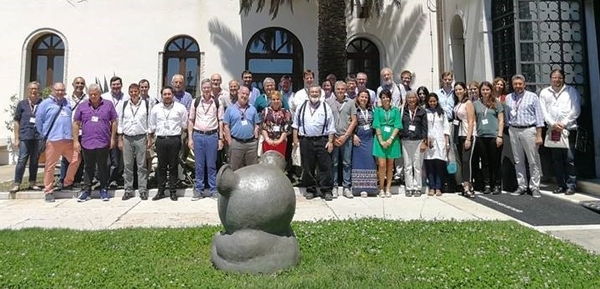Improving a cooperation network between actors involved in conservation and utilization of Beta genetic resources
Activity Coordinator: Piergiorgio Stevanato email
The project on “Improving a cooperation network between actors involved in conservation and utilization of Beta genetic resources (BETANET)”, re-submitted by the Beta Working Group for funding under the Fifth Call of the ECPGR Activity Grant Scheme, was selected by the Executive Committee in October 2017.
- Activity proposal (226,7 KB)
Implementation
The BETANET meeting took place 19-20 June 2018 at San Servolo, Venice, Italy (see meeting website)
Summary of the meeting:
The meeting was organized by the Department of Agronomy, Food, Natural resources, Animals and Environment (DAFNAE), University of Padova (Italy) and the Council for Research in Agriculture and Agricultural Economy Analysis (CREA), Italy to convene researchers as well as partners in industry from European and non-European countries who are involved in the conservation, characterization, documentation and utilization of beet genetic resources.
Forty-one participants attended the meeting, including members of the Beta WG, World Beta Network (WBN) and representatives from the breeding sector, genebanks and users from the public and private sector.
During the meeting, an in situ management workplan was outlined, which will include a list of Most Appropriate Wild Populations (MAWP). Nigel Maxted, Coordinator of the Farmer’s Pride project and Chair of the Wild Species Conservation in Genetic Reserves WG was participating and this helped the Beta WG to closely collaborate with the Farmer’s Pride team and allow for fine-tuning the crop-specific activities of the ECPGR Activity Grant Scheme proposal with the overarching activities of the EU project. The connection between BETANET and the Farmer's Pride project for the common goals of the two projects will be enhanced after the meeting and further elaborated with involvement of the Farmer’s Pride project team.
Scientific presentations given by the participants (oral and posters) covered ongoing research projects on genetic diversity, conservation, evaluation and utilization of beet PGR in Europe and non-European countries.
Stephan Weise, the EURISCO Coordinator explained the upload procedures for characterization and evaluation (C&E) data into EURISCO, including the integration of the historical data that are documented in the International Database for Beet (IDBB).
Participants discussed the importance to facilitate the conservation and sustainable use of the Beta and Patellifolia genetic resources, above all as regards the genetic resistances to biotic and abiotic stresses, through strengthening the relationships between the different stakeholders.
The long-term goal and the objectives of ECPGR Phase X (2019-2023) were mentioned and suggestions were made to support the implementation of these objectives through the Beta WG activities towards the conservation, evaluation, documentation and utilization of Beta genetic resources but also the ECPGR and the Beta WG to support the stakeholders’ activities. It was also emphasised that a strong network will facilitate the dissemination of knowledge, exchange of experience and opinions and enhance the relationship and the collaboration between the plant genetic resources conservation communities and users and the decision of an in situ management work plan on Beta.
Other funding opportunities and calls to fund innovative research projects (e.g. H2020, LIFE, COST, PRIMA) were discussed which will underpin the value of Beta genetic resources.
The aims of the BETANET Activity were mentioned, suggestions were made and the final recommendations emerged from the meeting were prepared and presented by Parthenopi Ralli, Lothar Frese and Piergiorgio Stevanato. Discussions focused on the improvement of a long-term in situ and ex situ conservation of beet genetic resources in Europe with a specific focus on complementary conservation action planning. A list of MAWP will be available at the end of the action. The respective sites can be used to establish a European multi-species genetic reserve network for the active in situ conservation of Beta and Patellifolia species. The recommendations addressed, among others, the transfer of the data (including the C&E data) from IDBB into EURISCO and the exploration of the possibility to link EURISCO with the AKER project database. The production of information material on beet genetic resources conservation and use, the establishment of an evaluation network for screening disease resistance among Beta members and the development of a BETANET website, linked to ECPGR website and in cooperation with non-European members, with a list of useful links to existing web resources about Beta networks, were suggested too.
The outcomes of the meeting will be relevant to the Beta WG and the WBN but also to the Beta community. Since the previous joint meeting of the ECPGR Beta WG and the WBN was organized six years before (20-22 June 2012), at Cappelle-en-Pévèle, France, the BETANET project offered a new opportunity to establish close collaboration with all ECPGR and non-ECPGR members, to improve the existing partnerships and to build new links between all stakeholder groups involved in beet genetic resources programmes.
The detailed meeting report and the complementary conservation workplan are in preparation.
- Agenda (1,2 MB)
- List of participants (340,4 KB)
- Presentations given at the meeting
